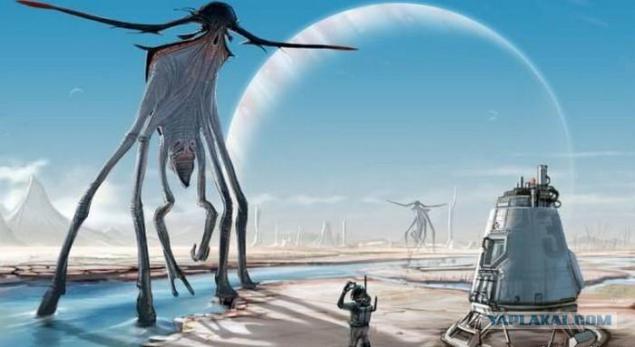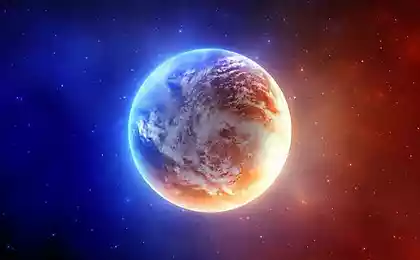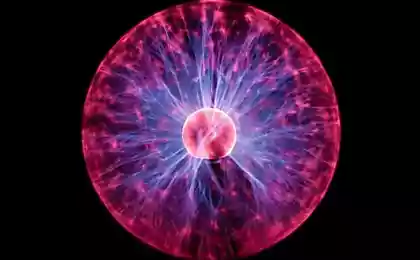776
On other planets could be life
Seven good reasons for that on other planets may be life
We do not (yet) direct evidence of the fact that on other planets, their satellites, as well as in interstellar space there is life. Nevertheless, there is a very compelling and convincing reasons to believe that over time we will find a life, maybe even in our solar system.

Here are seven reasons why scientists believe that life is somewhere definitely exists and is waiting for a meeting with us. Maybe it will not be green-skinned ladies in flying saucers, but it will still be aliens.
1. Extremophiles the world
One of the main questions is whether to exist and develop in the worlds of life radically different from Earth's. It seems that the answer to this question is yes, if you think about the fact that even on this planet there are extremophiles, or organisms capable of surviving in extreme conditions of heat, cold, exposure to toxic (for us), chemicals, and even in a vacuum. We found the creatures that live without oxygen on the edge of the hot volcanic vents on the ocean floor. We found life in the brackish waters high in the Andes mountains, and in subglacial lake in the Arctic. There is even a tiny organisms called tardigrades (Tardigrada), able to survive in the vacuum of space. So we have direct evidence that life could exist quite successfully in hostile environments on Earth. In other words, we know that life is the ability to maintain the conditions that we have seen on other planets and their satellites. We just have not found her.
2. Evidence of the starting materials and prototypes for life on other planets and satellites
Perhaps life on Earth originated from a chemical reaction that eventually formed the cell membrane and the proto-DNA. But these primary chemical reactions can begin in the atmosphere and the ocean with complex organic compounds, such as nucleic acids, proteins, carbohydrates and lipids. There is evidence that such "precursors of life" already exist in other worlds. There are in Titan's atmosphere, astronomers noticed them in the rich environment of the Orion Nebula. Again, this does not mean that we have found life. However, we found the ingredients that, according to many scientists contributed to the development of life on Earth. If these ingredients are distributed throughout the universe, it is quite possible that life appeared in other places, not just on our own planet.
3. The rapidly increasing number of planets similar to Earth
Over the last decade hunters celestial bodies discovered hundreds of planets outside the solar system, many of which, like Jupiter, are gas giants. However, new methods for finding planets and allowed them to find a small, solid worlds such as Earth. Some of them are even in orbit around its star in the so-called "habitable zone" that is, at a distance, when they occur in temperature close to the earth. And given the myriad of planets outside the solar system, it is likely that one of them there is some form of life. 4. The great diversity and resilience of life on Earth
Life on Earth has evolved in extremely difficult conditions. Sometimes she was able to survive the most powerful volcanic eruptions, meteorite impacts, ice ages, droughts, acidification of the oceans, and a radical change in the atmosphere. We are also seeing an incredible diversity of life on our planet in a relatively short period of time - in geological terms. Life is also quite stable thing. Why would not it be conceived not take root on one of Saturn's moons, or in another star system?
5. mystery surrounding the origin of life on Earth
Although we have a theory about the origin of life on Earth, in which the figure I mentioned earlier complex carbon molecules, ultimately, it is a great mystery how these chemicals are combined to form a fragile membrane, over time, become cells. And the more we learn about what a hostile environment existed on Earth when life originated and evolved - filled atmosphere of methane, boiling lava on the surface - the more mysterious it becomes the secret origin of life. There is one general theory, which states that a simple one-celled life really originated somewhere else, maybe on Mars, and it brought to Earth meteorites. This theory pansermii, and it is based on the hypothesis that life on Earth originated through life on other planets.
6. The oceans and lakes are widespread, at least in our solar system
Life on earth originated in the ocean, and this implies that the water she could appear in other worlds. There is strong evidence that water once flowed on Mars is free and abundant, and on Saturn's moon Titan has methane seas and rivers flowing over its surface. It is believed that Jupiter's moon Europa is one big ocean warmed crust of the moon completely covered with a thick protective layer of ice. In any of these worlds could once harbor life, maybe there is now.
Posted in [mergetime] 1357580965 [/ mergetime]
7. Evolutionary Theory
People often use the Fermi paradox as evidence that we never find intelligent life in our universe. On the other side stands the evolutionary theory that postulates that life adapts to environmental conditions. Darwin and his contemporaries hardly thought about life on planets outside the solar system, when creating his theory of evolution, however, and they argued that where life can take root, it will do it. And if you think that our environment is not only the world, but other star systems and interstellar space, it can be suggested within the original interpretation of the theory of evolution - that life and adapt to the open space, too. In one day we can meet creatures that have evolved ways unimaginable for us. Or we will be able to someday become such creatures.
- I finished!
Source:
We do not (yet) direct evidence of the fact that on other planets, their satellites, as well as in interstellar space there is life. Nevertheless, there is a very compelling and convincing reasons to believe that over time we will find a life, maybe even in our solar system.

Here are seven reasons why scientists believe that life is somewhere definitely exists and is waiting for a meeting with us. Maybe it will not be green-skinned ladies in flying saucers, but it will still be aliens.
1. Extremophiles the world
One of the main questions is whether to exist and develop in the worlds of life radically different from Earth's. It seems that the answer to this question is yes, if you think about the fact that even on this planet there are extremophiles, or organisms capable of surviving in extreme conditions of heat, cold, exposure to toxic (for us), chemicals, and even in a vacuum. We found the creatures that live without oxygen on the edge of the hot volcanic vents on the ocean floor. We found life in the brackish waters high in the Andes mountains, and in subglacial lake in the Arctic. There is even a tiny organisms called tardigrades (Tardigrada), able to survive in the vacuum of space. So we have direct evidence that life could exist quite successfully in hostile environments on Earth. In other words, we know that life is the ability to maintain the conditions that we have seen on other planets and their satellites. We just have not found her.
2. Evidence of the starting materials and prototypes for life on other planets and satellites
Perhaps life on Earth originated from a chemical reaction that eventually formed the cell membrane and the proto-DNA. But these primary chemical reactions can begin in the atmosphere and the ocean with complex organic compounds, such as nucleic acids, proteins, carbohydrates and lipids. There is evidence that such "precursors of life" already exist in other worlds. There are in Titan's atmosphere, astronomers noticed them in the rich environment of the Orion Nebula. Again, this does not mean that we have found life. However, we found the ingredients that, according to many scientists contributed to the development of life on Earth. If these ingredients are distributed throughout the universe, it is quite possible that life appeared in other places, not just on our own planet.
3. The rapidly increasing number of planets similar to Earth
Over the last decade hunters celestial bodies discovered hundreds of planets outside the solar system, many of which, like Jupiter, are gas giants. However, new methods for finding planets and allowed them to find a small, solid worlds such as Earth. Some of them are even in orbit around its star in the so-called "habitable zone" that is, at a distance, when they occur in temperature close to the earth. And given the myriad of planets outside the solar system, it is likely that one of them there is some form of life. 4. The great diversity and resilience of life on Earth
Life on Earth has evolved in extremely difficult conditions. Sometimes she was able to survive the most powerful volcanic eruptions, meteorite impacts, ice ages, droughts, acidification of the oceans, and a radical change in the atmosphere. We are also seeing an incredible diversity of life on our planet in a relatively short period of time - in geological terms. Life is also quite stable thing. Why would not it be conceived not take root on one of Saturn's moons, or in another star system?
5. mystery surrounding the origin of life on Earth
Although we have a theory about the origin of life on Earth, in which the figure I mentioned earlier complex carbon molecules, ultimately, it is a great mystery how these chemicals are combined to form a fragile membrane, over time, become cells. And the more we learn about what a hostile environment existed on Earth when life originated and evolved - filled atmosphere of methane, boiling lava on the surface - the more mysterious it becomes the secret origin of life. There is one general theory, which states that a simple one-celled life really originated somewhere else, maybe on Mars, and it brought to Earth meteorites. This theory pansermii, and it is based on the hypothesis that life on Earth originated through life on other planets.
6. The oceans and lakes are widespread, at least in our solar system
Life on earth originated in the ocean, and this implies that the water she could appear in other worlds. There is strong evidence that water once flowed on Mars is free and abundant, and on Saturn's moon Titan has methane seas and rivers flowing over its surface. It is believed that Jupiter's moon Europa is one big ocean warmed crust of the moon completely covered with a thick protective layer of ice. In any of these worlds could once harbor life, maybe there is now.
Posted in [mergetime] 1357580965 [/ mergetime]
7. Evolutionary Theory
People often use the Fermi paradox as evidence that we never find intelligent life in our universe. On the other side stands the evolutionary theory that postulates that life adapts to environmental conditions. Darwin and his contemporaries hardly thought about life on planets outside the solar system, when creating his theory of evolution, however, and they argued that where life can take root, it will do it. And if you think that our environment is not only the world, but other star systems and interstellar space, it can be suggested within the original interpretation of the theory of evolution - that life and adapt to the open space, too. In one day we can meet creatures that have evolved ways unimaginable for us. Or we will be able to someday become such creatures.
- I finished!
Source:























